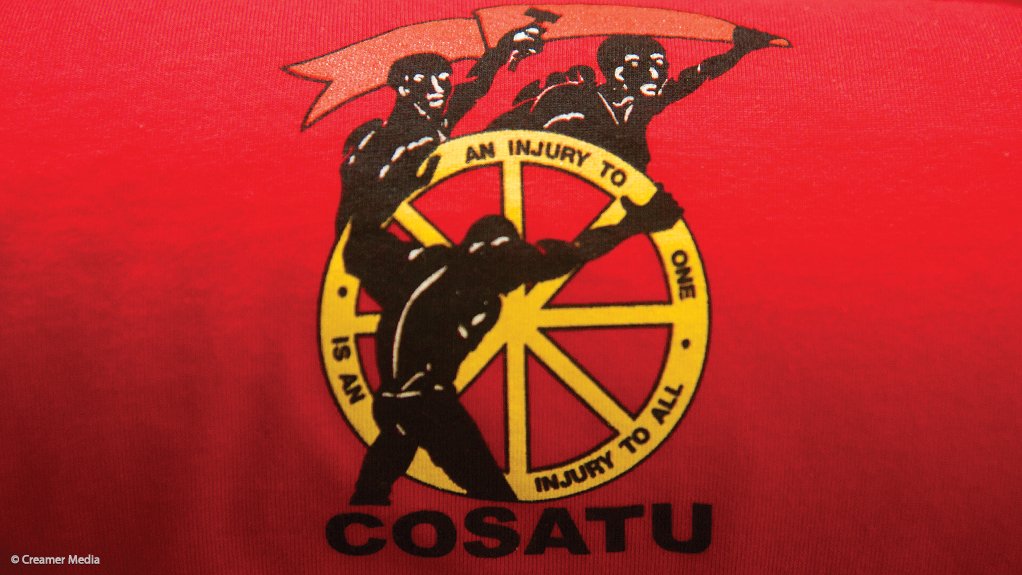/ MEDIA STATEMENT / The content on this page is not written by Polity.org.za, but is supplied by third parties. This content does not constitute news reporting by Polity.org.za.
The Congress of South African Trade Unions (COSATU) and its Affiliates commemorated the International Day of Decent Work across workplaces today Friday 6 October. This Day is a rallying point to mobilise workers and cajole government and employers to not simply settle for any type of work but to rather aspire to the goals of decent work where workers are treated as partners in building economies and not as glorified slaves.
COSATU and its Affiliates marked the Day of Decent Work across workplaces in all provinces. Marches took place in Tshwane, Bloemfontein, Kimberly and Newcastle amongst other cities and towns to tackle employers who fail to pay staff timeously, to honour signed wage increases or who abuse the most basic labour rights. Other events included pickets at key government and business premises in Cape Town as well as the major urban centres in Mpumalanga, Limpopo, the Eastern Cape and the North West. Workers who could not attend marches embarked upon 2 hour go slows across workplaces.
The Federation is heartened by the overwhelming response, excitement and militancy that workers have shown to COSATU’s call for action and activities today. Workers have not only painted the streets of Tshwane and many other towns and cities red today, but made their presence felt on shop floors and workplaces in sectors and industries across the nation.
Decent work is important for workers in South Africa who experience often horrific working conditions. COSATU and its Affiliates continue to wage various campaigns to translate the objectives of Decent Work into a lived reality. Key pillars include:
Ensuring compliance with the National Minimum Wage (NMW) Act that has raised the wages of 6 million workers across the private sector, especially in the agriculture, domestic, construction and retail sectors. COSATU will be intensifying programmes with the Department of Employment and Labour to tackle the 45% of eligible workplaces that continue to pay workers below the NMW.
Whilst employers must comply with the NMW and other wage agreements, if workers are to live and not merely survive and to be able to buy the goods the economy produces, then employers need to pay workers a living wage. Workers cannot be productive, healthy or motivated, neither can the economy grow, if they are paid poverty wages.
Salaries need to include not merely wages but also pension, medical, education and other benefits to enable workers to take care of essential needs and improve the lives of their families.
Employers need to pay staff what they are owed timeously. COSATU and its Affiliates are continuously intervening in municipalities, DENEL, the Post Office and other workplaces where employers fail to pay staff their salaries or to hand over their statutory and other deductions to the various pension, medical aid, Unemployment Insurance and Compensation Funds. The recent findings by the Financial Sector Conduct Authority that at least R7 billion in workers’ pension funds has been stolen by 3200 employers is a wakeup call for everyone.
Halting the trend to treat workers as permanently temporary or simply to outsource them to labour brokers. This is no longer simply a private sector scandal but is creeping into the public sector.
Providing a safe workspace for workers, in particular women. Gender based violence and sexual harassment at work is a crime and should not be tolerated. The recent legislative amendments are powerful tools in the fight against this national shame.
Workers must be protected from injuries and deaths at the workplace in particular high-risk jobs. Each week we lose on average one mine worker and one police officer. The National Defence Force tragically lost 7 members in two accidents recently. Employers who fail to ensure a safe environment for their employees must face the full force of the law.
South Africa is scarred by the legacies of apartheid and colonialism and remains the world’s most unequal society. The recent Employment Equity Report highlighting that 62% of management posts are held by White South Africans is a reminder of how far we have still to go. The Employment Equity Amendment Act that has now come into effect will be an important tool to nudge recalcitrant employers to ensure that all employees are able to reach their full potential and not condemned to menial jobs because of the colour of their skin or gender.
Workers are parents and their legal rights to paid time off and overtime need to be accepted by all employers.
The constitutional rights to join unions and collective bargaining are key to addressing workers’ grievances and ensuring labour market stability and need to be respected by all employers.
These activities are protected by a Section 77 certificate issued by Nedlac. No worker can be sanctioned or threatened for joining these activities. Any employer who seeks to do so, should be reported to COSATU and the Department of Employment and Labour or the CCMA where they will be dealt with.
Issued by COSATU
EMAIL THIS ARTICLE SAVE THIS ARTICLE ARTICLE ENQUIRY
To subscribe email subscriptions@creamermedia.co.za or click here
To advertise email advertising@creamermedia.co.za or click here











